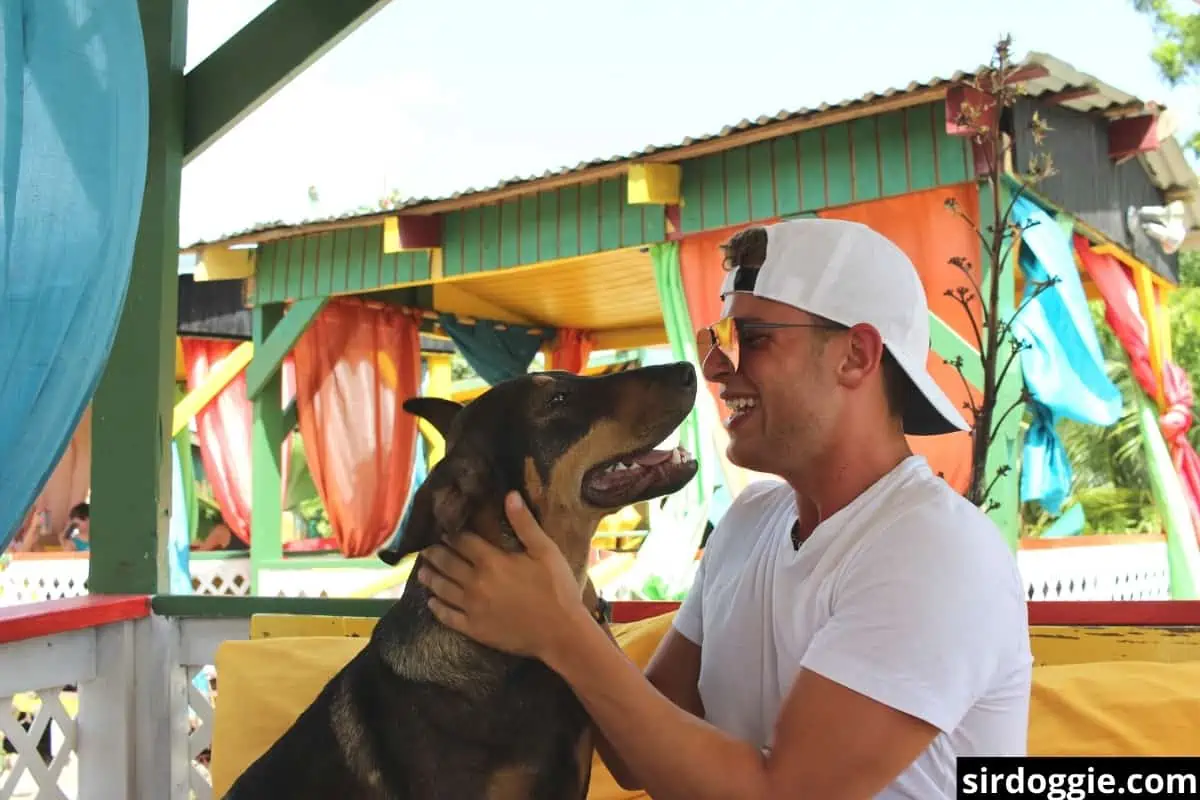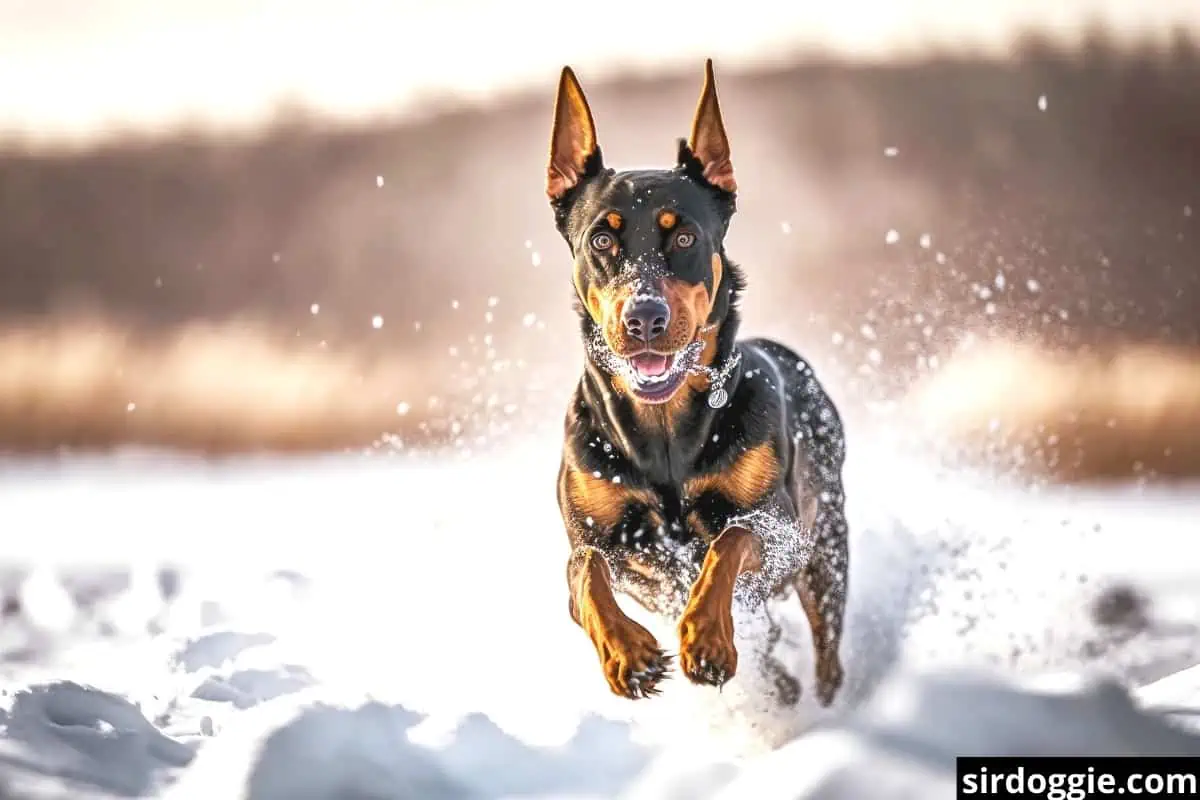Why Does My Doberman Shake? [7 Problems]
If you’re a proud owner of a Doberman, you may have noticed your furry friend shaking or shivering from time to time.
As a family dog expert, I get asked often about the common behavior of beloved dogs (Yes Dobermans are family dogs) and how concerned you should be. You are not alone in worrying!
While it’s normal for dogs to shake occasionally, excessive shaking could be a sign of an underlying issue that requires attention. Understanding why your Doberman is shaking can help you determine if it’s a cause for concern or not.

There are several reasons why your Doberman may be shaking. Some of the most common reasons include cold, fear, anxiety, pain, excitement, and stress. While some of these reasons are harmless, others can be a sign of a more serious problem. Knowing the cause of your Doberman’s shaking can help you determine the best course of action to keep your furry friend healthy and happy.
10 Most Common Causes of a Shaking Doberman
| Cause | Description |
|---|---|
| 1. Anxiety or stress | Dogs may shake when they are anxious, scared, or stressed, often as a result of a new environment or stimulus. |
| 2. Cold temperatures | Shivering helps dogs generate heat when they are cold, just like humans. Keep them warm to prevent shaking. |
| 3. Excitement or anticipation | Some dogs shake when they are excited, such as when they see their owner or anticipate playtime or a treat. |
| 4. Pain or discomfort | Shaking can be a sign of pain or discomfort, often indicating an injury or underlying health issue. |
| 5. Nausea or gastrointestinal upset | Dogs may shake when they feel nauseous or experience gastrointestinal discomfort, possibly due to illness or diet. |
| 6. Generalized Tremor Syndrome | This condition, also known as “shaker syndrome,” causes uncontrolled shaking in dogs and often requires treatment. |
| 7. Seizure activity | Shaking can be an early sign of seizure activity in dogs and may warrant medical attention. |
| 8. Muscle weakness or injury | Muscular weakness or injury may cause shaking as the dog’s body tries to compensate or manage the pain. |
| 9. Aging or neurological issues | Older dogs or those with neurological issues may shake due to muscle weakness, loss of coordination, or disease. |
| 10. Poisoning or toxic exposure | Shaking can be a symptom of poisoning or exposure to toxic substances, which requires immediate medical care. |
Normal vs Problem Shaking Signs for Dobermans
It is essential to recognize the difference between normal shaking and worrying shaking signs in a Doberman to ensure their well-being. By understanding these differences, you can address potential health issues or discomfort more effectively.

Normal Shaking:
- Excitement or Anticipation: Dobermans may shake or tremble when they are excited to see their owner, play, or receive a treat. This type of shaking is typically short-lived and subsides once the excitement has passed.
- Cold Temperatures: Dobermans have short coat and may shiver when exposed to cold temperatures. If your dog is shaking from the cold, providing a warm blanket or a coat can help alleviate their discomfort.
- Wet Fur: If your Doberman has been in the water or caught in the rain, they may shake to help dry themselves off. This behavior is natural and should stop once their fur is dry.
Worrying Shaking Signs:
- Persistent or Intense Shaking: If your Doberman is shaking continuously or more intensely than usual, this could be a sign of an underlying issue, such as pain, injury, or illness.
- Accompanied by Other Symptoms: Shaking that occurs alongside other symptoms like vomiting, diarrhea, lethargy, loss of appetite, or difficulty breathing may indicate a health problem that requires veterinary attention.
- Behavioral Changes: If your Doberman’s shaking is accompanied by unusual behavior, such as aggression, hiding, or excessive clinginess, this could signal anxiety, stress, or an underlying health issue.
- Inability to Settle: If your Doberman is shaking and cannot seem to get comfortable, even when provided with warmth and a calm environment, it could indicate pain or discomfort that needs to be addressed.
- Shaking After Exposure to Toxins: If your Doberman starts shaking after coming into contact with a potentially toxic substance (e.g., household chemicals, certain plants, or human medications), they may be experiencing poisoning and require immediate veterinary care.
If you notice worrying shaking signs in your Doberman, it is crucial to consult with a veterinarian to determine the cause and appropriate treatment. Regular check-ups and monitoring your dog’s overall well-being can help prevent and address health issues more effectively.

Medical Reasons
Pain or Discomfort
One of the medical reasons why your Doberman may be shaking is because of pain or discomfort. This can be due to a variety of reasons such as arthritis, hip dysplasia, or an injury. If your dog is shaking and also showing signs of pain such as limping or whining, it’s important to take them to the vet to get checked out. Your vet may prescribe pain medication or recommend physical therapy to help your dog feel more comfortable.
Illness or Disease
Another medical reason why your Doberman may be shaking is because of an underlying illness or disease. Some illnesses that can cause shaking include kidney disease, liver disease, and hypoglycemia.
If your dog is shaking and also showing other symptoms such as vomiting or diarrhea, it’s important to take them to the vet as soon as possible. Your vet may recommend diagnostic tests such as blood work or x-rays to determine the underlying cause of the shaking.

Seizures or Tremors
Seizures or tremors can also be a medical reason why your Doberman may be shaking. Seizures can be caused by a variety of reasons such as epilepsy or brain tumors. Tremors, on the other hand, can be caused by conditions such as idiopathic head tremors or degenerative myelopathy. If your dog is shaking and also showing signs of a seizure such as convulsions or loss of consciousness, it’s important to seek emergency veterinary care. Your vet may recommend medication to help control seizures or tremors.
Behavioral Reasons
Fear or Anxiety
One of the most common behavioral reasons for a Doberman to shake is fear or anxiety. This can be caused by a variety of things, such as loud noises, new environments, or separation anxiety. If your Doberman is shaking and showing signs of fear or anxiety, it’s important to identify the trigger and address it. This may involve desensitization training, providing a safe space for your Doberman, or seeking the help of a professional dog trainer or behaviorist.

Excitement or Anticipation
Dobermans are known for their high energy and enthusiasm, and they can often shake with excitement or anticipation. This may happen when they see their favorite toy or when they’re about to go for a walk. While this type of shaking is generally harmless, it’s important to make sure your Doberman doesn’t become overly excited and lose control. Providing plenty of exercise and mental stimulation can help reduce this type of shaking.
Boredom or Frustration
Another reason why Dobermans may shake is boredom or frustration. If your Doberman isn’t getting enough exercise or mental stimulation, they may become restless and start shaking. Providing plenty of toys, puzzles, and playtime can help keep your Doberman entertained and reduce this type of shaking. Additionally, if your Doberman is shaking due to frustration, it may be helpful to provide clear boundaries and training to help them understand what is expected of them.
Environmental Reasons

Temperature Changes
Dobermans are sensitive to temperature changes, and they may start shaking if they feel too cold or too hot. If your Doberman is shaking and the temperature is low, try to make them warm by providing them with a blanket or turning up the heat. Similarly, if it’s hot outside, make sure your Doberman has access to water and a cool place to rest.
Noise or Vibrations
Dobermans can be sensitive to loud noises or vibrations, which can cause them to shake. If your Doberman is shaking and you suspect that noise or vibrations are the cause, try to remove them from the environment or provide them with a safe space where they can feel more comfortable. For example, if there’s construction happening nearby, move your Doberman to a quieter room or play some calming music.

Medication or Supplements
Some medications or supplements can cause shaking in Dobermans. If your Doberman is shaking and you’ve recently started them on a new medication or supplement, it’s possible that this is the cause. Consult with your veterinarian to determine if the medication or supplement needs to be adjusted or discontinued.
It’s important to note that shaking can also be a symptom of an underlying medical condition. If your Doberman is shaking frequently or the shaking is accompanied by other symptoms, such as lethargy or loss of appetite, it’s important to consult with your veterinarian to rule out any underlying health issues.

Family Dog Expert Author
Hi there! I’m Stuart, a devoted dog lover and family dog expert with over a decade of experience working with our furry companions. My passion for dogs drives me to share my knowledge and expertise, helping families build strong, loving bonds with their four-legged friends. When I’m not writing for SirDoggie, you’ll find me hiking, playing with my beautiful dog, or studying music.